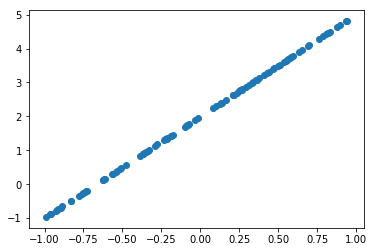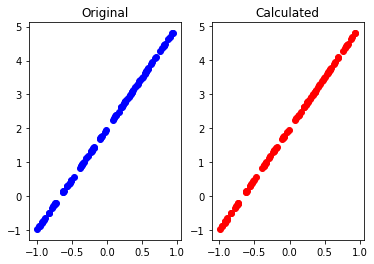Simplest neural network example in Fastai/Pytorch
What can be a simplest neural network example?
# only on google colab
!curl -s https://course.fast.ai/setup/colab | bash
Updating fastai...
Done.
Simple Implementation
We will implement simplest neural network with simple example of a line.
A line is represented as
$ y = ax + b $
$ y = a_1x + a_2 x$
$ y = a_1x_1 + a_2 x_2$
$ y_i = a_1x_{1i} + a_2 x_{2i}$
=> to represent a point on a line
$y$ is a dot product to matrix $x$ & $a$ i.neural networke
$\bar y $ =X $\bar a $
Create the line
%matplotlib inline
from fastai.basics import *
n = 100
x = torch.ones(n,2)
x[:,0].uniform_(-1.,1)
x[:5]
tensor([[-0.5704, 1.0000],
[-0.4755, 1.0000],
[ 0.5086, 1.0000],
[-0.3661, 1.0000],
[ 0.4988, 1.0000]])
a = tensor(3.,2); a
tensor([3., 2.])
y = x@a #+ torch.rand(n)
plt.scatter(x[:,0], y);

In NN we have only x & y. a is not available to us and we have to predict a.
To start calculation we randomly initialize a
Loss function
def mse(y_hat, y):
return ((y_hat-y)**2).mean()
a = nn.Parameter(torch.rand(2)); a
Parameter containing:
tensor([0.5055, 0.0874], requires_grad=True)
def update():
y_hat = x @ a
loss = mse(y_hat, y)
if t%10==0:
print(loss)
loss.backward()
# torch.no_grad() set requires_grad flag to false
# requires_grad means this layer is available for training
with torch.no_grad():
# the gradient is showing where the next value of a should reside.
# we subtract it from previous value.
a.sub_(lr * a.grad)
a.grad.zero_()
Little training
lr = 1e-1
for t in range(100):
update()
tensor(5.4649, grad_fn=<MeanBackward0>)
tensor(0.5915, grad_fn=<MeanBackward0>)
tensor(0.1551, grad_fn=<MeanBackward0>)
tensor(0.0434, grad_fn=<MeanBackward0>)
tensor(0.0122, grad_fn=<MeanBackward0>)
tensor(0.0034, grad_fn=<MeanBackward0>)
tensor(0.0010, grad_fn=<MeanBackward0>)
tensor(0.0003, grad_fn=<MeanBackward0>)
tensor(7.5263e-05, grad_fn=<MeanBackward0>)
tensor(2.1110e-05, grad_fn=<MeanBackward0>)
a
Parameter containing:
tensor([2.9956, 1.9999], requires_grad=True)
Result visualization
We can the value of predicted a is close to original [3,2]
plt.subplot(1, 2, 1)
plt.scatter(x[:,0],y, c='b')
plt.title("Original")
plt.subplot(1, 2, 2)
plt.scatter(x[:,0],x@a, c='r');
plt.title("Calculated")
Text(0.5, 1.0, 'Calculated')

Thanks https://fast.ai for this example.